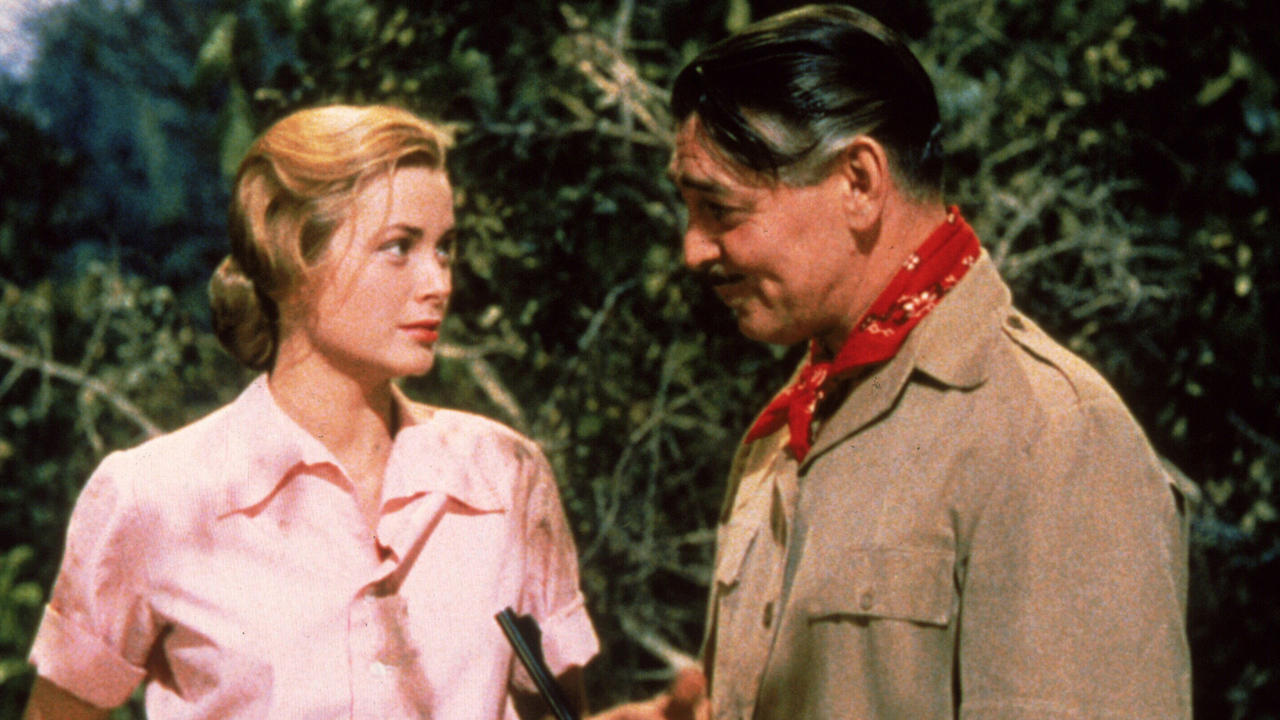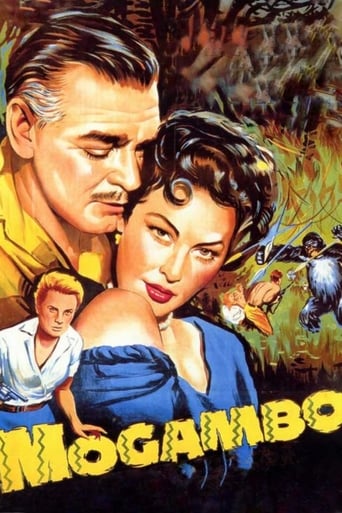

John Ford was one of the finest craftsmen in the history of the cinema, and even though this movie isn't one of his greatest films it still is very interesting to watch. During the course of the movie I felt like I was watching an alternative safari version of "The Great Gatsby" but without the triangle between Gatsby Tom and Daisy, but it is kind of a gender difference with this movie dealing with a man and two women. The movie was shot entirely on an African safari just like "King Solomon's Mines" (1950) was only comparison between the two is that this one was a better movie. The movie stars Clark Gable as Vincent Marswell who owns a big game trapping company in the country of Kenya, and in the beginning of the movie he meets an American woman named Eloise Kelly (Ava Gardner) and they start becoming friends after she came to the safari to meet someone that was supposed to be there but never showed up to meet her. Then after Kelly is supposed to leave a married couple show up whose names are Donald Nordley (Donald Sinden) and his wife Linda (Grace Kelly). Marswell and Linda are attracted to each other but it isn't that obvious at first glance even though it gets more obvious. During the making of this movie Clark Gable had a tough time with Ford due to his terrible treatment towards Ava Gardner on the set of the movie and because of that this was the only film that the two men ever worked on together. Ford was an expert with using his surroundings to frame a movie making a movie of his a visual treat to look at, the performances are decent but if I had to choose my personal favorites come from both Gable and Kelly, though I thought that Gardner could have tweaked her performance a little bit even though it was very good and because of her work she along with Grace Kelly got Oscar nominations. Like "King Solomon's Mines" this is a very informative film to watch and the cinematography by none other than Robert Surtees makes the scenery of both films very breathtaking. Though this isn't a great movie it is a very well-written one even though the script could have been improved upon. Even though I still would recommend this movie to anyone interested in learning about African wildlife.
... View MoreWestern director John Ford was more or less asleep at the wheel on this jungle epic, with the stars given a tepid script rife with fifties clichés about the roles men and women play in the moral scheme of things. Gable had done the same role some 20 years earlier in the hugely entertaining, zippy precode Red Dust with sassy Jean Harlow and salty Mary Astor, but Grace Kelly and Ava Gardner, while holding their own in the beauty department, are given next to nothing to work with, except perhaps for Ava's tussle in the mud with a baby elephant. Gable goes through the motions of being The Great White Hunter with his customary professionalism, but looks fairly bored. The idea of hunting down and killing gorillas is certainly as outmoded today as the romantic clichés--but there is some excellent footage of native African dances and some nice scenery,though nothing one can't see to more advantage in a National Geographicspecial. Recommended only for star fans as Saturday matinée material.
... View MoreWow. This film, I have heard about, but I have never seen it. Reportedy, it is a remake of Red Dust (never saw that either) which also starred Clark Gable. I hate to say it (Being a fan of Gable, Grace Kelly, and ESPECIALLY--Ava Gardner.....this was a disappointment.Yes there were big stars, yes, it was beautifully photographed, yes, you got to see Ava Gardner (hey I never get tired of that), BUT what is it that was going on? Not much. They hung around camp, talked, talked, and talked some more. Ava decides to take a walk...not a good idea considering where they are....he has to go save her, etc.A lot of people have concerns about how the animals were treated, the implicit racism etc. but you have to remember, this was made in 1953. You can't really judge what when on in 1953 but 2011 standards. People still try though.Eh I don't know what else to write about the movie...because to me...there was nothing there.Sadly disappointed.
... View MoreMogambo (1953)I can't look at a movie like this without asking who is in control, who is being abused, who is plundering, and why does the movie not talk about these discrepancies of power? African Queen, made just two years earlier, faces the same problem from a different direction, narrowing our view to the changing of two archetypes toward mutual understanding, largely avoiding the cultural problem. In Mogambo, the movie expands outward, with decreasing interest and believability. Yes, it has to be said, there are some stunning wildlife scenes, and some genuine (and valuable) indigenous singing and shots of tribal Africans on location. The film was largely shot in Africa, and it feels authentic in that way, a long way from earlier versions shot on a Hollywood lot.But Mogambo, a remake of the better "Red Dust," is a kind of embarrassingly bad movie in other ways. There's just no getting around the poorly developed characters, the almost non-existent "plot" (nothing much happens) and even the unconvincing romances, which should have won me over since I'm a sucker. John Ford is famously a masculine director, just as was John Huston ("African Queen"), and Ford became famous for making movies about the changing of one world order for another--the American Western. In a weird, simplistic way, this is another Western, with outsiders improbably facing strange territory and hostility, and with everyone misunderstanding at least something that leads them astray. The starring actor makes it worthwhile, for those of us who admire him, Clark Gable. Grace Kelly also appears, but as usual is largely ornamental and too ivory to advance the plot.Ava Gardner is whole other problem. She's full of life but has a miserable script to read from, and is made to be a caricature of a ditzy New York woman in wild Africa. Well, Ford "fleshes" her out in his own way, but Gable is more respectful, as usual. Either way, her performance ends up crippling some of the authenticity of the rest of it. She does have a fearless and quaint way with the animals (and the baby elephants in particular are super cute). In fact, if animal rights concern you, you might have trouble with all the trapped, hunted, and caged wildlife. Seen from 2010, this is a revealing and disturbing and frivolous, white colonialist's view of Africa. If you aren't distracted by the glib Gardner and the artificial Kelly, or by the attempts to be humorous, and to set the two woman against each other (one proper, in a dress, the other less so, in pants), you'll see some interesting footage. Intermittent footage is not my idea of a good movie.
... View More